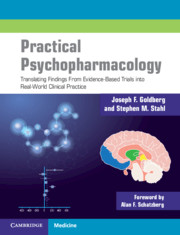 Practical Psychopharmacology
Practical Psychopharmacology Book contents
- Practical Psychopharmacology
- Practical Psychopharmacology
- Copyright page
- Dedication
- Contents
- Foreword
- Preface
- Abbreviations
- Part I General Principles
- Part II Targets of Pharmacotherapy
- 13 Disordered Mood and Affect
- 14 Disorders of Impulsivity, Compulsivity, and Aggression
- 15 Psychosis
- 16 Deficit States and Negative Symptoms
- 17 Anxiety
- 18 Addiction and the Reward Pathway
- 19 Trauma and Post-traumatic Stress Disorder
- 20 Personality Disorders and Traits
- 21 Cognition
- 22 Putting It All Together
- References
- Index
19 - Trauma and Post-traumatic Stress Disorder
from Part II - Targets of Pharmacotherapy
Published online by Cambridge University Press: 19 October 2021
- Practical Psychopharmacology
- Practical Psychopharmacology
- Copyright page
- Dedication
- Contents
- Foreword
- Preface
- Abbreviations
- Part I General Principles
- Part II Targets of Pharmacotherapy
- 13 Disordered Mood and Affect
- 14 Disorders of Impulsivity, Compulsivity, and Aggression
- 15 Psychosis
- 16 Deficit States and Negative Symptoms
- 17 Anxiety
- 18 Addiction and the Reward Pathway
- 19 Trauma and Post-traumatic Stress Disorder
- 20 Personality Disorders and Traits
- 21 Cognition
- 22 Putting It All Together
- References
- Index
Summary
Trauma and dissociation are together often thought of as falling more within the treatment realm of cognitive-behavioral psychotherapy than psychopharmacology. Indeed, in the case of PTSD, trauma-focused psychotherapies collectively exert larger effect sizes than seen with pharmacotherapies (Watts et al., 2013; Lee et al., 2016), which in the aggregate yield response rates only of about 20–30%. Yet, in order to understand the potential relevance of pharmacotherapy to psychological trauma, one must first appreciate the interplay between trauma’s psychological and neurobiological corollaries. Traumatic events form durable, emotionally based memories consolidated through limbic circuitry – in turn affecting emotional regulation and broad cognitive domains (attentional processing and vigilance, executive function, and impulse control). Environmental cues that become associated with threats to one’s physical and/or emotional well-being become aversive and can elicit fear responses, involving autonomic hyperarousal and vigilance, and can prompt intrusive, repetitive thought patterns laced with negative affect states.
- Type
- Chapter
- Information
- Practical PsychopharmacologyTranslating Findings From Evidence-Based Trials into Real-World Clinical Practice, pp. 447 - 464Publisher: Cambridge University PressPrint publication year: 2021


